Confused about whether to choose LingoDeer vs Babbel? Want to know which one is the better choice for you? We can help you out. In this article, I have compared both these competitors in detail that will help you decide on choosing between the two and decide which one of these would be ideal for you.
LingoDeer
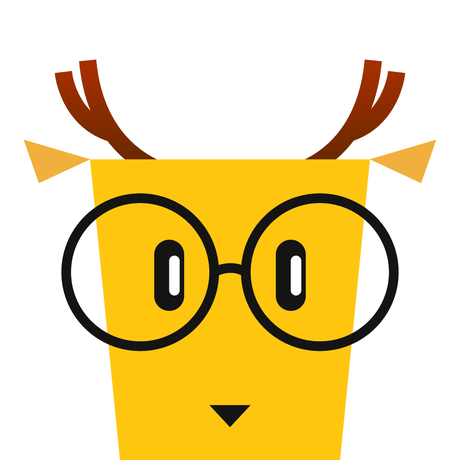 Check out
Check out
Babbel
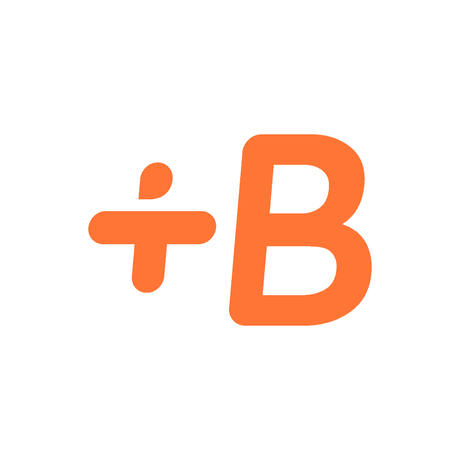 Check out
Pricing
Check out
Pricing$ 14.99
$ 12.95
Best forLingoDeer is a language-learning application that teaches 12 different languages via the use of engaging, interactive games and exercises. Chinese, French, German, Korean, Japanese, Portuguese, Russian, Spanish, and Vietnamese are among the languages taught in the app.
Babbel is a cost-effective language-learning application. It's a subscription-based service that will assist you in learning 14 languages via their site. This online language education provider operates on a curriculum-based model with pre-recorded material.
Features Pros/Advantags Cons- Their courses and exercises lack real-life speech
- After a time, the teachings might become tedious and simple.
Looking for LingoDeer vs Babbel, I am here to help you.
LingoDeer is a language-learning application that teaches 12 different languages via the use of engaging, interactive games and exercises. Chinese, French, German, Korean, Japanese, Portuguese, Russian, Spanish, and Vietnamese are among the languages taught in the app.
There is a seven-day free trial, but after that, a membership is required. Subscribers check-in using their email address to either the website or the app to access the learning material, but they may study languages at their speed, even if it's just for 10 minutes each day.
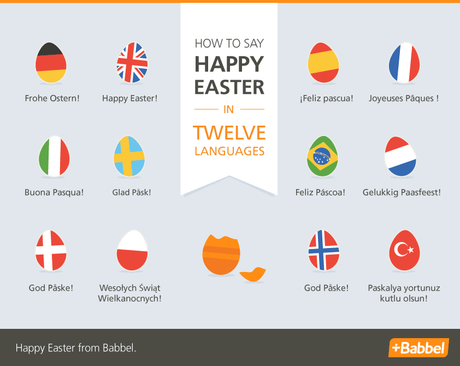
Babbel is a cost-effective language-learning application. It's a subscription-based service that will assist you in learning 14 languages via their site. This online language education provider operates on a curriculum-based model with pre-recorded material. As a result, Babbel does not include any live contact.
Babbel combines well-known quiz-style course components with vocabulary practice tools, exercises, pronunciation, and grammar instructors.
Babbel's users tend to be mostly individuals who have just begun learning a new language. As a result, it's easy to infer that this program isn't ideal for those trying to expand their vocabulary or enhance their sentence constructions.
One advantage of Babbel is that it enables you to bounce between various levels. This essentially implies that you may adjust the difficulty if you believe it is too simple or is intended for more sophisticated users than you. This is a unique feature that the majority of other language learning programs (for example, Duolingo) do not have.
Thus, with Babbel, you are not required to begin from the beginning and progress until you reach the level for which you are most equipped. In other words, it enables you to level the playing field somewhat with higher-level language learners.
Lingodeer -
Lingodeer's teachings are divided into categories such as family, numbers, food, and health.
However, each language begins with teaching the letters. While it may seem self-evident that this is the best place to begin, this is not necessarily the case with other resources.
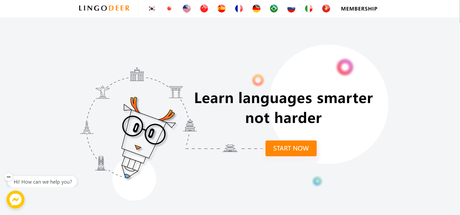
I thought the alphabet portion to be incredibly exhaustive, maybe even too so, for each language. It extends beyond the alphabet and delves quite far into pronunciation, including topics such as word stress, exceptions, explanations, and how to create the sound, as well as a large number of words for which you may click to hear the pronunciation.
This part is lengthy, but I've always believed that it's worthwhile to devote significant work early on to mastering pronunciation. While this may not be sufficient in and of itself, Lingodeer goes far further in teaching pronunciation here than you will find in the majority of other applications.
After finishing the alphabet course (or earlier, if you wish), you'll go on to the topic-based modules.
This works rather well, although as is the case with most courses that divide their information in this manner, you will sometimes study less essential topics before learning more key terms.
Taking this a step further, the terms for lawyer and robot appeared in the first lesson of the Spanish course called Basics. They are not necessary terms for complete novices. It would be preferable if they began with more acceptable words.
The German course did seem to be a lot more realistic in comparison to what they first taught.
The arrangement of the units and the substance of the lessons seem to change according to the language being studied.
This indicates to me that they do not just duplicate the information for each language, as some other services do. After experimenting with Rosetta Stone, I got the idea that was their intention.
Indeed, Lingodeer seems to differentiate the material somewhat depending on the language being taught. For instance, the Spanish and Chinese classes educated students about meals that are more appropriate for each language. Thus, it seems as if there is some endeavour to make the teachings culturally relevant.
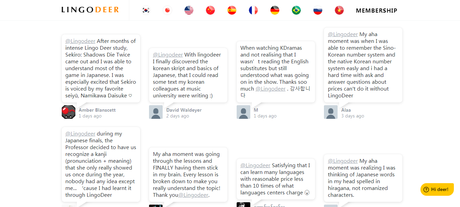
There are several of these subject-specific mini-units. At the time of writing, there are moreover 60 for each language, with more on the way.
Each unit comprises between two and five lessons, as well as a few grammar lessons dubbed Learning Tips. Additionally, several languages conclude each unit with a tale.
If you are not a total novice, you may advance to the next section of the course by trying off prior material. This is an exam of the subject presented, in which you will complete a series of activities to demonstrate that you understand the topic. You are allowed three errors; if you make more than three, you must restart or finish the prior lessons.
Babbel -
Babbel's structure is rather straightforward. There are lessons in each course, and unless you have previous knowledge of the language and choose to skip forward, you are expected to complete them in sequence.
One rather perplexing section is Topics. Topics enable you to specialize in a particular area of the language, such as Business German, Countries and Traditions, but also Grammar, Speaking, and Listening. Babbel automatically assigns you a Topic depending on your interests, which you provide when you join up.
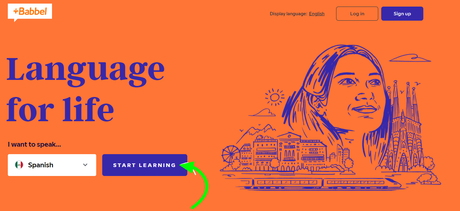
As I did, beginners may find themselves in the Words and Sentences Topic. However, if you switch Topics, it might be challenging to remember what you were studying before the move and how to return to it.
Babbel would benefit from graphically organizing these Topics so that you can quickly view them all at once and recall what you've learned so far, a kind of learning roadmap. If you never switch Topics, everything is crystal obvious. You log on, and the next lesson you're supposed to complete is immediately shown.
The length of the shows varies in the same manner as their substance fluctuates.
There are six levels in the German course: Pre-intermediate (three courses), Intermediate (three courses), and Independent (two courses). Additional lessons on Grammar, Listening and Speaking Business German, Countries and Traditions, and more may be found in the area under More Courses.
In comparison, the Dutch curriculum includes Beginner I (4 courses), Beginner II (4 courses), and Pre-intermediate (4 courses) (two courses). Additionally, Dutch features a section for Additional Courses, with significantly fewer courses than German.
Throughout the very first classes, you will encounter explainers, little statements that explain something about the language. They are often interwoven with interactive questions that require you to demonstrate that you have read and comprehended the information.
If you are unfamiliar with a language, these classes will assist you in becoming acquainted with new sounds, letters, and ideas. If you enter Babbel with some prior knowledge of a language and take a placement exam, you may be able to skip these portions. Even if you choose to skip them, you have access to them and may complete them at any time.
If you work consistently in Babbel, the app will always display the next course in your program when you check in. You have the option of skipping forward or repeating classes at any time.
This is not possible with all applications. For instance, Duolingo prevents you from accessing advanced classes until you have completed a sufficient number of the previous ones.
Lingodeer -
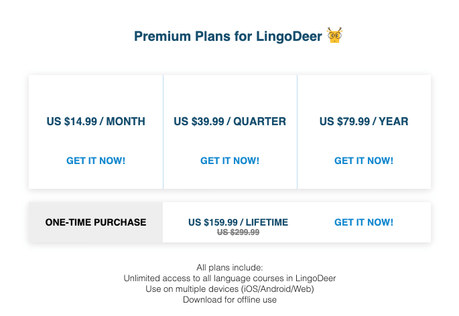
They have 3 premium plans to offer -
- Monthly Plan: This will cost you $ 14.99 per month.
- Quarterly Plan: This will cost you $ 39.99 per month.
- Yearly Plan: This will cost you $ 79.99 per year.
You can also purchase LingoDeer for one time, this will cost you $ 159.99 for a lifetime.
Babbel -

They have 4 premium plans to offer -
- 1-month plan: This will cost you $ 12.95 per month
- 3-month plan: This will cost you $ 8.95 per month.
- 6-month plan: This will cost you $ 7.45 per month.
- 12-months plan: This will cost you $ 6.95 per month.
Verdict - LingoDeer Vs Babbel
As you can see, the pricing plans of both these platforms are very similar. However, the general premium plans of Babbel are slightly better than those of LingoDeer. On the other hand, the one-time purchase of LingoDeer is extremely beneficial. So, decide for yourself.
LingoDeer Vs Babbel Pros and Cons
LingoDeer
Pros
- Better course summary to help you pick.
- Better Asian language courses.
- The alphabet is taught at the start of the course since learning a new language requires learning the alphabet.
- Between the classes, there are many useful hints and notes to remember.
- The audios are crisp and aid in pronouncing words.
- The grammatical course offered by Lingodeer sets it apart from other apps. They have a textbook grammatical syllabus.
- Lingodeer includes several activities to help you learn the language.
Cons
- Because their courses and exercises lack real-life speech skills, some students become stuck.
Babbel
Pros
- The platform is simple to navigate.
- You acquire genuine vocabulary and expressions.
- The teachings are intuitive.
- Babbel identifies your errors and instructs you on how to correct them.
- It aids in the review of a language you previously studied.
Cons
- After a time, the teachings might become tedious and simple.
As you can see in the comparison, both Babbel and LingoDeer are tough competitors. However, there are certain advantages for LingoDeer. LingoDeer has more features and better course structure than Babbel which is the most significant reason why one must choose LingoDeer over Babbel.
The pricing difference between LingoDeer and Babbel is not very much either. However, Babbel is a little less pricey but the LingoDeer one-time purchase plan is unmatchable. So, I would recommend LingoDeer.
Quick Links
